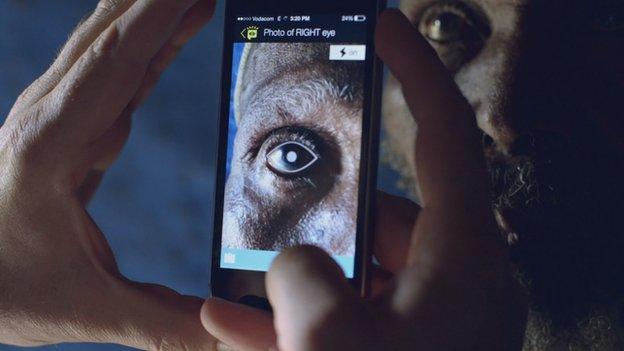Scratch-card to check medicine is real
- Published
Patients and medics can check the drugs are valid by texting the code
Fake medicines are a major problem in parts of Africa - but a mobile phone based scheme which allows patients - and doctors - to check drugs are real is expanding fast.
With the M-Pedigree scheme, the customer scratches the medication package to reveal a code which they send to a free number.
They then receive a text back that lets them know if the item is genuine or counterfeit.
M-Pedigree was formally launched in Ghana in 2007 and it has expanded to Nigeria and East Africa and India.
The hope is that by using technologies like M-Pedigree and other software, consumers can focus on getting better, rather than worrying if they have purchased a fake medication or product.
Safety assurance
Monique (not her real name), had her first child by Caesarean section, but developed complications with her stitches post-operatively.
When her baby was about a month old she felt a little bit of thread sticking out of her surgery scar.
"I started to touch it and I realised I could actually pull it out," she said.
"Over a few days I was able to pull out a few of these things which then caused my C-section wound to become infected.
"Because of that I had to go back into hospital and go back into theatre and have these threads - as I called them then - surgically removed.
"It was then that the doctor told me that these sutures were most probably counterfeit sutures that were sold to him."
Monique is not alone.
'Almost perfect' fakes
Sales of counterfeit medicines globally could exceed $75bn (£50bn) a year, according to a US study done in 2013, putting health - and lives - at risk.
In Ghana, the food and drug authority estimates a third of all medicines on the market are fake.
Thomas Amedzro, head of drug enforcement for Ghana's Food and Drug Administration, says that as the packaging on many of these fraudulent products is "almost perfect" in how it replicates that of the genuine medicine, it is almost impossible for the consumer to tell the difference.
It was only when the FDA closely scrutinised some of these near-perfect fakes that they noticed a small but important difference - the expiry dates on the counterfeit packs were often longer than would be recommended for Ghana's climate.
Bright Simons is the brains behind M-Pedigree, and he believes it is the only solution anywhere in the world at any scale that "allows the consumer when they buy the medicine to confirm if that pack of medicine, that single pack of medicine they are holding is genuine".
Mr Simons says that for his innovation to really gain traction across the continent and further afield, it needs a better response from regulators and the pharmaceutical industry in the relevant countries.
M-Pedigree is one of several anti-counterfeit technologies being tested out across the world, in places such as Ghana, Nigeria and India. Other similar measures include barcodes and handheld scanners.
Mr Simons says Nigeria is one country demonstrating how a co-ordinated effort can tackle the issue of counterfeit medicine successfully.
"We've seen tremendous changes in the way that medicines are sold in that country, to the extent that in some parts of the country, already patients are able to reject medicine instantly by noticing that there's no label.
"Why? Because anti-malarials and a great number of antibiotics are required by regulation to have these stickers, these technology pieces on them so that consumers can validate instantly."
Med in Africa is a brand new eight-part series showcasing health innovations across Africa and what these might mean for the future of healthcare on the continent and beyond.
- Published17 March 2015
